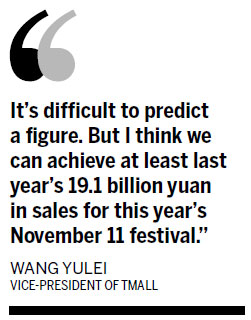Alibaba's holds lofty goals for Singles Day
Updated: 2013-10-16 07:05
By He Wei and Meng Jing in Hangzhou (China Daily)
|
||||||||

Alibaba Group Holding Ltd is planning to use the upcoming Singles Day as a catalyst to revolutionize the retail industry by encouraging more brick-and-mortar stores to get Web savvy.
Many young Chinese people celebrate Singles Day, also know as Double Eleven, on Nov 11, with bachelor parties held across the country.
Last year, the company's Tmall and Taobao marketplaces generated a combined 19.1 billion yuan ($3.12 billion) in daily sales for their Double Eleven promotions, double the revenue generated by the United States' Cyber Monday, which is the Monday after Black Friday, the Friday following Thanksgiving.
This year, the country's largest e-commerce company plans to move beyond just another shopping spree. It plans to enhance its users' stickiness and integrate more of its applications to mark the date by investing more on big data projects and on revamping supply chains.
"We aim to lay the groundwork for the industry and become a barometer for future shopping trends," said Wang Yulei, vice-president of Tmall, Alibaba's business-to-customer unit.
"It's difficult to predict a figure. But I think we can achieve at least last year's 19.1 billion yuan in sales for this year's November 11 festival," Wang said at Alibaba's headquarters in Hangzhou.
Tmall will offer cash incentives worth as much as 300 million yuan to encourage people to get involved in China's biggest online shopping date, which promises discounts of up to 50 percent for some products.
Unlike previous years, those who successfully share their cash vouchers with their friends via social network sites such as Sina Weibo - a Twitter-like micro-blogging service - will see their bonuses doubled.
Alibaba already allows consumers to connect their user IDs with Sina after the e-commerce giant bought an 18 percent stake in Weibo for $586 million in April.
About 20,000 online vendors have agreed to participate in the promotions to mark the date, doubling last year's number. The company also plans to involve about 30,000 brick-and-mortar retailers in this year's event.
Rather than just offering a unified homepage for all online shoppers, Alibaba will introduce for the first time the chance for each shopper to see a tailor-made homepage, backed by its big data projects that track and analyze consumers' shopping habits on the site.
To handle the surging number of deliveries expected for the date, courier firms have been expanding their warehouses since the beginning of the year.
According to Alibaba, each of the 13 main courier companies in China has invested at least 1 billion yuan to upgrade their infrastructure. As many as 150 warehouses have been built or expanded.
Many domestic counterparts have joined the fray this year, hoping to cash in on the occasion. However, Alibaba, thanks to its first-mover advantage, leads the pack.
Meanwhile, widespread discounts have pushed some firms into the red. Jing Dong Mall, which rolled out a similar promotion in October, is likely to face even wider losses as it strives to catch up with Tmall, while online clothing vendor Vancl's goal to become profitable was jeopardized by a recent scandal, with some suppliers alleging the company breached payment contracts.
Most Viewed
Editor's Picks

|

|

|

|

|

|
Today's Top News
Mexico demands US response over spying scandal
Breast cancer on the rise
Hong Kong, AmEx host culinary feast
Yao, NBA to open training school for teens
IMAX: China exceeds CEO's expectations
Last-ditch effort on debt ceiling
China-UK cooperation projects inked
Alcoa CEO to be feted by US-China Committee
US Weekly

|

|














